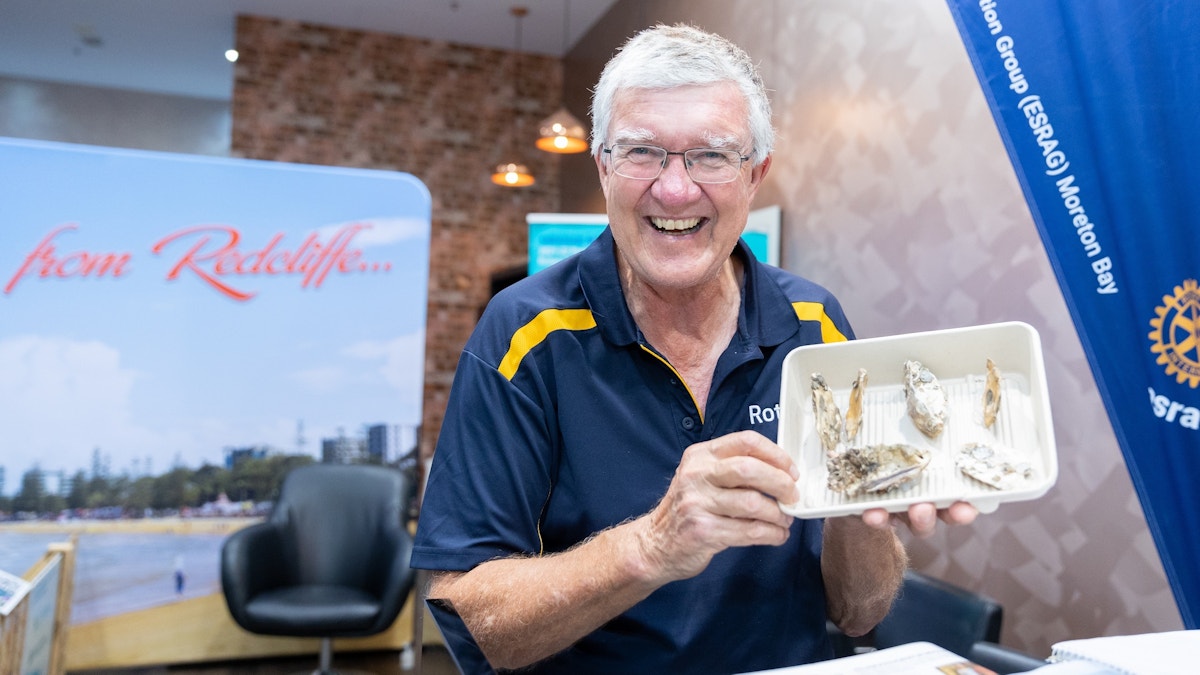
Who’s Who in 2022, Environment: Colin Scobie
Published 4:00am 16 December 2022

Colin Scobie and colleagues from the Redcliffe Sunrise Rotary Club’s Environmental Sustainability Rotary Action Group (ESRAG) are helping transform Moreton Bay one oyster shell at a time.
They’ve joined forces with OzFish volunteers to work on the Moreton Bay Oyster Reef Restoration Project.
It’s a simple concept that aims to restore oyster numbers in Moreton Bay by collecting, cleaning and returning shells to the waterway.
ESRAG volunteers collect oyster shells from venues around the Moreton Bay Region, working with Ozfish to regenerate oyster reefs in Moreton Bay.
Morgans Seafood at Scarborough, The Belvedere Hotel and The Komo are already taking part in the Moreton Bay Oyster Reef Restoration Project.
Between mid-April and June, The Belvedere Hotel diverted more than 12,000 oyster shells from landfill to help build new habitat for the tasty molluscs, while The Komo contributed more than 2000 shells in its first month of participation.
Colin says being part of the Moreton Bay Oyster Reef Restoration Project requires vigilance from venue staff to ensure salt, lemon and other garnishes are removed before they are placed in bins, but the effort is worth it.
“It stops the shells going to landfill and it restores the fish habitat,” Colin says.
“There’s a whole cycle of habitat and the oysters improve the habitat for fish.
“As well, the basket reefs are good at stopping storm surges and act as a buffer between the ocean and the mangroves.”
Colin says the club, which houses its blue collection bins at the Clontarf waste facility thanks to Moreton Bay Regional Council, eventually hopes to expand the program to include other wholesalers and restaurants.
From Clontarf, the shells are taken to a special area at the Port of Brisbane, where they are spread out in the sun for six months to ensure they are bio-secure.
Working bees are held every couple of weeks, where shells are washed and put into steel baskets and taken out on a barge and dropped into the water at the Port of Brisbane.
What happens next is nothing short of magical – within about 10 weeks, oysters start to grow in the shells and other marine life make the baskets and surrounding water their home.
Colin says the amount of marine life found in the baskets after such a short period of time is astounding.
At present, Ozfish has permission to place the baskets near the Port of Brisbane but Colin is researching the possibility of placing baskets at seven locations around the Redcliffe peninsula. He will need approval from the State Government to proceed.
Colin is working with USC, UQ and Griffith University and other volunteers to count fish to get an idea of how many are in the area before baskets are added to the environment.
The Central Moreton Bay chapter of Ozfish hopes to restore 100ha of shellfish reef over the next 10 years.
OzFish says each restored hectare of native oyster reef can filter 2.7 billion litres of seawater, removing 225kg of nitrogen and phosphate, as well as producing an additional 2.5 tonnes of harvestable fish every year and diverting tonnes of used shells from landfill.
Colin says the shell-filled baskets are only placed where there are already oysters growing, to encourage oyster spat to lodge and create new colonies.
About Colin Scobie
Colin is not a marine biologist - he’s a retired MRI and body scanner salesman with a keen interest in protecting the environment.
He says it’s clear the bay is not as healthy as it could be and the opportunity to get involved in the project came up about a year ago, when Ozfish gave a presentation at Pumicestone Passage with Healthy Land and Water.
“I was interested in the environment and that’s how I got to hear about it. I thought it was something the Rotary Club could take on,” Colin says.
“Everyone got behind it.”
Supporters include the Moreton Bay Foundation, Moreton Bay Regional Council, the Federal and State governments, Healthy Land and Water, Unitywater and students from Redcliffe State High School and Southern Cross Catholic College, among others.
Colin says oysters are “kidneys of the ocean”, filtering 200L per day each, and while there are plenty of them on the Eastern side of Moreton Island there are fewer in the bay between it and the mainland.
This is due to diminishing water quality and “oyster recruitment” and even the high number taken from the bay and used in construction of the Brisbane CBD many years ago, he says.
“The idea is to bring out some awareness. Moreton Bay is precious, it’s effectively an extension of the Great Barrier Reef. It’s part of that ecosystem that we need to preserve,” Colin says.
The group is looking for more volunteers to help on working bee days and more restaurants and cafes to collect shells.
Related Stories
Top Stories

New harbour plan seeks 'middle ground'
An alternative master plan for Scarborough Harbour has been put forward aiming for the “middle ground” between campaigners and the State Government. ** FREE TO READ **


Popular Stories

Rising cost on Moreton Bay's roads
Animal collisions on Moreton Bay’s roads have risen sharply, according to motor claims figures released by RACQ. Here are the worst areas. ** FREE TO READ **

Cheesemaker's brush with fame
Little White Goat Cheese owner Karen Lindsay had her brush with TV fame after appearing on Gordan Ramsay’s Food Stars. Here's the story

Step up for sick kids with Starlight
Ella, who lives in Moreton Bay, is a thriving nine-year-old who has spent years battling Graves’ Disease. Now she urging us to support the foundation which helped her. ** FREE TO READ **













